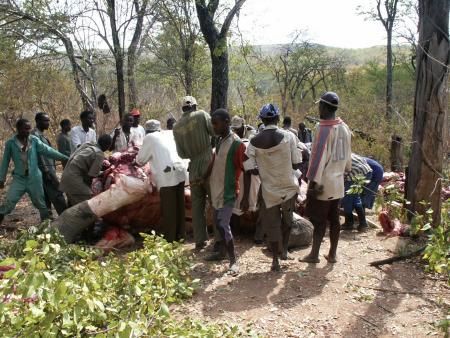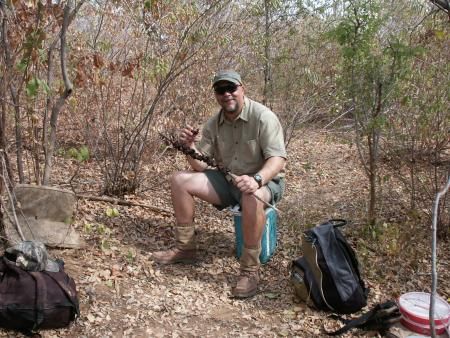

 The Accurate Reloading Forums
The Accurate Reloading Forums  THE ACCURATE RELOADING.COM FORUMS
THE ACCURATE RELOADING.COM FORUMS  Hunting
Hunting  African Big Game Hunting
African Big Game Hunting  Dead elephant, now what to do?
Dead elephant, now what to do?Go  | New  | Find  | Notify  | Tools  | Reply  |  |
| new member |
Hello everybody first time poster here, I'm not against elephant hunting but it does kind of seem like a waste to me. Question is what do those of you who hunt elephant to do with the carcass after you've made the kill shot? Is the meat any good to eat or is it a dry potent stingent foul meat? I have read about how the local tribes come in and take some of the meat and dry it into a sort of jerky right? Do you take a large share home with you, is refrigeration avaliable or does the majority of it go to waste? What about the tusk's? do you all just keep these as a trophy or sell them if it's legal or is it illigal to sell tusks nowadays? These are just a few questions I can think of about elephant hunting off the top of my head, Great forum you've got going here guys, I really enjoy reading it. | ||
|
| One Of Us |
Yes, the locals eat the meat... all of it. Think of elephant hunting this way... for what a sport hunter pays to kill the elephant... say $25K as a round number - that may not seem like a lot to you and I when talking about annual salaries... But consider that a "local" earns about $200.00/year - IF, i repeat IF that local can find a job. Unemployment runs around 80-90% in many of these countries. Economics considered, the sport hunters' economic contributions can create jobs for the locals and keep them fed - read: keep them from poaching animals to eat. Without those dollars, there are practically NO JOBS for the locals and they resort to indiscriminately killing animals with snares (leaving the majority of them to rot) and yes poaching elephants as well to sell their ivory & various organs on the black market. The problem with their poaching is its excess and waste. (It's hard to distribute meat from an illegal kill, i.e.: Poached animal). They are destroying their primary renewable natural resource. So, is it a perfect world where we live hapily ever after with the animals as one? No, but it's the world we have created with our habitat destruction. The sport hunter's dollars are the elephant's (and all other game animals in Africa) only hope for survival. | |||
|
| Moderator |
Well, first you invite the local villagers to drop by. They will cut leafy branches from the bushes and make a clean place to store the meat until they divide it up.  Then you have a seat and eat a few elephant kabobs. [Tastes like dry roast beef]. You should hope that the cook has remembered to put the salt shaker in the lunch box. Otherwise, the PH will be pissed off.  After most of the meat has been taken from the elephant. Load the tusks, some meat for camp and any old ladies who don't want to walk back to the village on the back of the Land Cruiser. Drop off the old ladies at the village. Deliver the trunk and other select cuts to the village chief. You can't sell the tusks. Just have your taxidermist mount them and put them in your house.  Regards, Terry  Msasi haogopi mwiba [A hunter is not afraid of thorns] | |||
|
| one of us |
Zach' In '94 I killed a previously wounded elephant that was being aggressive to the locals at 8 AM. When we returned to kill sight at 4PM that evening other than the skin, feet and tusks that the government claims in a PAC situation there was nothing left of the elephant except a wet spot on the ground and his penis. No the carcass is not wasted by any stretch of the imagination. I personally have found elephant to be quite tasty but what we had was very fresh and therefore very tough. Regards, Mark MARK H. YOUNG MARK'S EXCLUSIVE ADVENTURES 7094 Oakleigh Dr. Las Vegas, NV 89110 Office 702-848-1693 Cell, Whats App, Signal 307-250-1156 PREFERRED E-mail markttc@msn.com Website: myexclusiveadventures.com Skype: markhyhunter Check us out on https://www.facebook.com/pages...ures/627027353990716 | |||
|
| one of us |
Terry your trophy room Rocks, Please show us more. Thanks Rug | |||
|
| one of us |
You don't even have to invite the locals they just show up, the bush telegraph is an amazement...and feeding a protien hungry village for 90 days is a satisfaction IMO... I like the keep the tusks, skin, and the feet make nice wastepaper baskets and ash trays for you who smoke.. Eat an elephant foot cooked in the ground someday..I tried it once.. Ray Atkinson Atkinson Hunting Adventures 10 Ward Lane, Filer, Idaho, 83328 208-731-4120 rayatkinsonhunting@gmail.com | |||
|
| new member |
Thanks for the replys everyone fascinating how it all works out, I had no idea. Thats a really nice trophy room you have there T. Carr I've never seen tusks mounted like that they look great. Thanks for the info. | |||
|
| one of us |
ZachH, that is a fair question, and is answered easiest as what ever the news Media has stated, the truth will be exactly 180 degrees opposite! The fact is to answer you question in as few words as is possible, "No protein is wasted in Africa!" A more detailed answer is owed you, however, so here are the facts! The African elephant is in no way endangered, as a species. In fact, they are the only animal, second only to man, that destroys the very habitat he enjoys. The African Elephant is the most dietructive animal on the face of the Earth. He will turn lush forests into deasert in a short time by over garzing, and the killing of the trees. This distruction makes the land uninhabitable by most of the other animals as well, man included. He is over populated in most of his range today, and must be controlled. The only way to control the numbers of animals that weigh in at six tons for a large bull, down to about four tons for a cow, is to cull them. CULL is a nice word for KILL. In the case of the Elephant it is expencive to cull the Elephant by animal control. but if the Safari opperator is sold the licneses, he can book a hunt that will bring in $2000 per day, for a minimum of 21 days, in most cases, plus the trophy fee for the Elephant to the client starts is around $10.000, and concession fees, and firearm import fees, packing and dip fees, plus the meat is given to the locals for the most part. In the Cull of the Elephant, the funds are expended by the people, taken away from school, and medical care programs, and the damage the Ele did to their crops is simply their loss. In this case the poaching starts, because the local must feed his family. An African doesn't hunt for sport, but for meat, so if he has no meat, he poaches. In the case of safari hunting, he gets the meat anyway, and desperately needed forgien exchange is generated for those schools, and medical costs, and they get the meat anyway. Addtionally, the safari opperator, makes employeement for a couple hundred locals in his many camps, and the safaris in the field is a deterent to the roving poachers. Botswana alone needs to kill 10,000 elephant to keep them in balance with the habitat, and they only hand out about 800 license per year, and othe countries that are more populated need to kill many more than Botswana. Don't worry about the meat being used, eventhough meat cannot be imported from Africa to the USA, it is used none the less. If you think Hyenas, lions, and Vultures can clean the bones of a dead animal, they can't hold a light for the African local to butcher by! ....Mac >>>===(x)===> MacD37, ...and DUGABOY1 DRSS Charter member "If I die today, I've had a life well spent, for I've been to see the Elephant, and smelled the smoke of Africa!"~ME 1982 Hands of Old Elmer Keith  | |||
|
| one of us |
One bite at a time. Frank "I don't know what there is about buffalo that frightens me so.....He looks like he hates you personally. He looks like you owe him money." - Robert Ruark, Horn of the Hunter, 1953 NRA Life, SAF Life, CRPA Life, DRSS lite | |||
|
| One Of Us |
Zack, I was recently told by some people working in the Botswanan govt. that the habitat can only sustain about 50.000 elephant. At the moment there are about 145.000 elephant though... (which in a way is probably about same ratio as with the over-population of humans in africa?). Unfortunatly the photo-turism industry is trying to keep the govt. from culling the elepaht there. Their motivation is of course $$$. Seeing "tons" of elephant brings in lots of tourists who leave their money with these "photo-safari" companys. The fact that there would be more than enough elephant even if the total number was reduced by 2/3 apperantly is overlooked by these so-called "conservationists". The result will most likely be a crash in the elephant population due to lack of food and disease. By that time (and already showing) many of the smaller (and more endangered!) animals will/have been wiped out because the elephant destroy the habitat as Mac mentioned. The problem is that there is less and less vegitation near water sources. while the elephant have the capacity to travel long distances between food and water, it is not so with many smaller animals, who then die out. | |||
|
| one of us |
I think the price of elephant hunting is way to high. If it were more on the price level of a buffalo hunt more would do it. If they are that overpopulated, the governments should require that every 10day or longer hunt take an elephant. The sex of the elephant could be determined as local populations dictate. That is a win-win situation for everyone. square shooter | |||
|
| one of us |
So what happens to the meat in the Selous, where there aren't suppossed to be any villages? "There are worse memorials to a life well-lived than a pair of elephant tusks." Robert Ruark | |||
|
| one of us |
There is a great book by Ron Thomson called MAHOHBOH that is the final word on why elephants must be controlled by hunting and culling. He demonstrates through personal experience virtually every aspect of the subject. I had no desire to shoot an elephant until I read this book. Now, I'd do it in a heartbeat. You can get the book through Safari Press. DC300 DC300 | |||
|
| Moderator |
It unfortunately goes to waste except for camp meat. Something that really bothered the PH when I was there. There is a small village at the Kinyanguru train stop and we took some buffalo meat to them. Regards, Terry  Msasi haogopi mwiba [A hunter is not afraid of thorns] | |||
|
| one of us |
ZachH I've never shot an elephant but once I did come upon a group of Italian hunters who had just downed their elephant. They were breaking out the champagne. TerryR | |||
|
| one of us |
       | |||
|
| One Of Us |
David, Excellent pictures! Just out of curiousity, what did you take them with? Are they slides that you scanned afterwards? Or where they originally digital? | |||
|
| one of us |
Erik, Thanks. Sometimes pictures are better than words. As has been noted, no protein goes to waste in Africa. I took the pictures with a Canon EOS 10D, with a Canon 24-85mm lens. | |||
|
| one of us |
David, Oustanding pictures! Some of my favorites are of the staff and trackers. These are really exceptional. Thanks for sharing. Mark Jackson  | |||
|
| One of Us |
David W, as stated by others, those are some brilliant shots you captured. But I'm curious and have a question: tell me please, what is the fatty white substance that is cupped in the hand of the faceless woman with the green skirt? Is it intended for her to eat, or other? Thanks. ______________________ Hunting: I'd kill to participate. | |||
|
| one of us |
Thanks, Mark. Kamo, that is fat she is holding. I assume she intended to eat it, but I'm not sure. We counted over 300 people, who arrived to cut up the ele. After it was skinned and the tusks were removed, it was pandemonium as everyone rushed in to claim a piece of meat. One guy approached us for help, as he had reached in under an axe blow and had lost half of his right index finger. An interesting observation at both the hippo and elephant kills was that there was almost no cooperation among the people in recovering and dividing the meat. It was literally every man for himself, with plenty of angry shouting and a near knife fight at the hippo. | |||
|
| one of us |
In Botswana's Okavango, Michelletti Bates had some heavy duty bush trucks with hydraulics that could handle big chunks of elephant carcass. They could transport the meat out of the swamps to the local people, or the commercial meat processors somewhere. However, the truck near Kaparota camp was broken down, so the locals were called in, about a dozen men only, and they hacked and cut with their axes and butcher knives , and laid meat on mopane boughs. The carcass was stripped and hauled by bakkie loads to the small village nearby, where it was turned into biltong and FRESH MEAT!, as Motsoomee would say. I've got a disk with digital pictures of the tycoon's elephant butchery, maybe I will add to the photo-depot here. My PH and I hauled meat for them, to help with the harvest. In Botswana, it was all very orderly and efficient. No waste or mayhem. | |||
|
| one of us |
its also a rush to approach an elephant, they will kill you given the chance, it aint like walking up and shooting a cow, its alot of work and dangerous. sorry about the spelling, I missed that class. | |||
|
| Powered by Social Strata |
| Please Wait. Your request is being processed... |
|
 The Accurate Reloading Forums
The Accurate Reloading Forums  THE ACCURATE RELOADING.COM FORUMS
THE ACCURATE RELOADING.COM FORUMS  Hunting
Hunting  African Big Game Hunting
African Big Game Hunting  Dead elephant, now what to do?
Dead elephant, now what to do?

Visit our on-line store for AR Memorabilia

